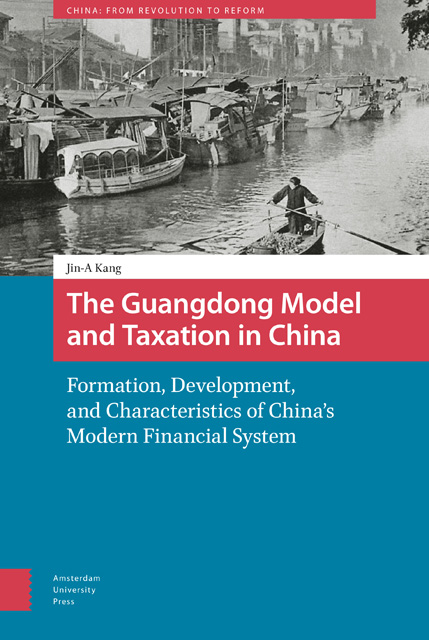 The Guangdong Model and Taxation in China
The Guangdong Model and Taxation in China Book contents
- Frontmatter
- Table of Contents
- Abbreviations
- Acknowledgments
- Introduction: The Modern Transformation of the Imperial Fiscal System: The Case of Provincial Finance in Guangdong
- Part 1 New Tax Revenues in Guangdong during the Republican Era
- Part 2 State-led Industrialization and the State Monopoly
- Part 3 Reform of Tax Collection
- Part 4 The Transition of the Modern Chinese Tax Structure in a Global Context
- Bibliography
- Glossary
- Index
6 - The Sugar Monopoly: From Local to National
Published online by Cambridge University Press: 10 January 2023
- Frontmatter
- Table of Contents
- Abbreviations
- Acknowledgments
- Introduction: The Modern Transformation of the Imperial Fiscal System: The Case of Provincial Finance in Guangdong
- Part 1 New Tax Revenues in Guangdong during the Republican Era
- Part 2 State-led Industrialization and the State Monopoly
- Part 3 Reform of Tax Collection
- Part 4 The Transition of the Modern Chinese Tax Structure in a Global Context
- Bibliography
- Glossary
- Index
Summary
Abstract
The project of the Guangdong provincial government to revive the sugar industry consisted of the building of state-run sugar factories for production and strict official control over distribution. Guangdong's sugar monopoly was the first such attempt in Republican China. Chapter 6 examines the abortive state monopoly trial of the Nationalist Government in Nanjing in 1935. The success of Guangdong's sugar monopoly has led to an unexpected collaboration between the two rivals in Nanjing and Guangzhou. The central government would run a national sugar monopoly, while Guangdong's refineries would act as sugar suppliers. It was an ambitious plan to expand the state-owned sugar monopoly in Guangdong nationwide. However, this trial ended in suspension due to the strong opposition from Shanghai sugar merchants and foreign sugar capitals.
Keywords: sugar, monopoly, Guangdong, Nanjing Nationalist Government, Shanghai, Butterfield & Swire
Merchants and the sugar monopoly
The project of the Guangdong provincial government to revive the sugar industry consisted of the building of state-run mechanized sugar factories for production and strict official control over distribution. Guangdong's sugar monopoly, characteristic of the industrialization led by the Guangdong provincial government (hereafter, the GPG), was the first such attempt in Republican China, and the policy had a significant impact on the provincial economy.
The GPG abolished the existing native sugar tax (tutangjuan) and instead imposed the Special Tax on Imported Sugar in May 1934. It was claimed this measure would protect both native sugar and refined sugar produced by the future state-run sugar factories.
- Type
- Chapter
- Information
- The Guangdong Model and Taxation in ChinaFormation, Development, and Characteristics of China's Modern Financial System, pp. 155 - 172Publisher: Amsterdam University PressPrint publication year: 2022
